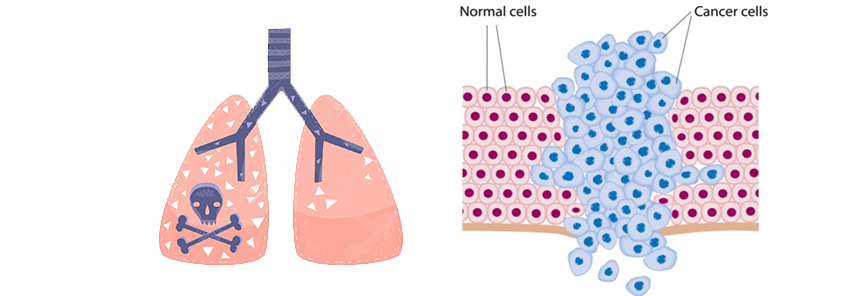Cancer

- Age- risk of cancer increase as you grow older but cancer can occur at any age.
- Lifestyle factors:
- Smoking – increases risk of many cancer like lung cancer, cancer of mouth, head and neck.
- Alcohol- head and neck cancer, esophagus, breast cancer, colorectal cancer.
- Unsafe and early sexual encounter- cervical cancer
- Diet/nutrition: food high in cholesterol, high consumption of smoked food, obesity and lack of physical activity.
- Radiation exposure from sun or during cancer treatment or from frequent imagings.
- Environmental factors:
- Occupational exposure to asbestos, cancer causing chemicals like benzene, pesticides, radiation etc
- Passive second hand smoking
- Air pollution
- Infections like Human Papilloma Virus, Hepatitis B
- Diseases like ulcerative colitis, cirrhosis of liver, HIV/AIDS
- Hormonal therapy
- Family history of cancer
- Unexplained loss of weight
- Fatigue
- Loss of appetite
- Unusual lump or swelling anywhere
- Skin changes
- Unexplained bleeding or bruising
- Change in bowel habits like persistent constipation, diarrhea.
- Cough or difficulty breathing
- Difficulty swallowing, indigestion
- Ulcer in mouth that is difficult to heal
- Unexplained fever or night sweats.
- Hoarseness of voice
- Blood in urine or stool, difficulty in urination
- Abnormal vaginal bleeding
- New mole or change in mole
- Blood tests
- Imaging: X-ray, Ultrasound,CT scan, MRI
- Endoscopy, bronchoscopy, cystoscopy etc
- Bone marrow tests, Lumbar puncture
- Biopsy: a sample of the tissue is taken to test microscopically to make a certain diagnosis
- Breast cancer: screened by Self breast examination and mammogram.
- Cervical cancer: screened by ‘Pap smear’.
- Colon cancer: screened by visualization of intestines through colonoscope, sigmoidoscope etc.
- Prostate cancer: screened by physical examination and ‘PSA’ test.
- Lung cancer: screened by special kind of X-ray called ‘low dose CT scan’.
- Ovarian cancer: screened by blood tests and ultrasound.
- Commonly there are three types of treatment options and are usually used in combination:
- Surgery: The cancer part is cut out from the affected body part.
- Chemotherapy: The doctors use special kind of medicines to kill the cancer cells or to stop them from growing further.
- Radiation therapy: The doctors use high energy radiation on the cancerous part to kill the cancer cells or to stop them from growing further.
- Other newer treatment methods are also being used these days like bone marrow transplant, hormone therapy, immune therapy and other special techniques (e.g. cutting off blood supply to tumor)
- Supportive treatment: medicines and other therapy for pain, nutrition support, recreation therapy etc
Cancer is a disease of abnormal cell proliferation. In a healthy organs, cells divide and grow in a regulated and controlled fashion. When these cell start to divide and grow unpredictably and uncontrollably, it develops into a lump know as tumor. These groups of abnormal cell can infiltrate causing destruction of surrounding structure or can spread to other parts of body. These tumors are called cancer. If the abnormal growth (tumor) doesn’t have the invading and spreading property , it is called a benign (non cancerous) tumor.
Cancer can originate in any part of the body. The original site is called the primary cancer. When cancer spreads to other organ, it is called a metastases or a secondary cancer. Once the cancer spreads beyond the primary organ, it cannot be cured. Prognosis and treatment options of a patient with cancer depends on the organ of origin, size of the tumor and the spread of the cancer.
Cause of Cancer
Cancer is caused by unwanted changes (mutations) in the genetic information contained in our DNA. These mutation can run down in families or these can be acquired over time. However, having these mutation doesn’t necessarily mean you will develop a cancer. It means you are more likely to develop a cancer when you are exposed to other cancer causing substances or environment called risk factors. In many cases of cancer the risk factors remain unknown.
Risk Factors
Symptoms
Cancer doesn’t cause symptoms until the late stage and when present they are often vague. Sign and symptoms could be localised to the organ involved in earlier stage. Some general symptoms of cancer include:
Diagnosis
If you feel that you have any of the above mentioned symptoms and are being worrisome, you should consult your doctor. The doctor will look for any abnormalities associated with the symptoms by performing physical examination and various tests. The tests are applied depending on where the cancer is suspected. These tests could also be a part of your regular follow up.
Screening
Cancers can be detected early by performing screening tests in apparently healthy persons. The cancers that can be screened are:
Treatment
The treatment of cancer varies according to the type, size, stage and spread of cancer. The aim of cancer treatment is to cure the cancer (if in early stage), control its progression and ease the associated symptoms.
Follow up
Once you are diagnosed with cancer you need a regular follow up. Follow up involves review of history, physical examination and necessary investigations. The aim of follow up is to check for recurrence or spread, to prevent or early detect other cancers, treat ongoing problems related to cancer and address the long term physical and psychosocial consequences of cancer after treatment. In addition, the doctor will provide you counseling on nutrition, fertility, pain management etc as well as refer you for occupational/ vocational therapy as required.
Prevention
At least one in three cancer cases are preventable and the number of cancer deaths could be reduced significantly by choosing a healthy lifestyle. You can prevent cancer by avoiding the above mentioned risk factors of cancer like smoking, alcoholism, poor diet, inactivity and obesity etc. Periodic screening and early detection are also effective preventive measures. You should get immunized for cervical cancer if available in your place.



Send us your feedback on this article